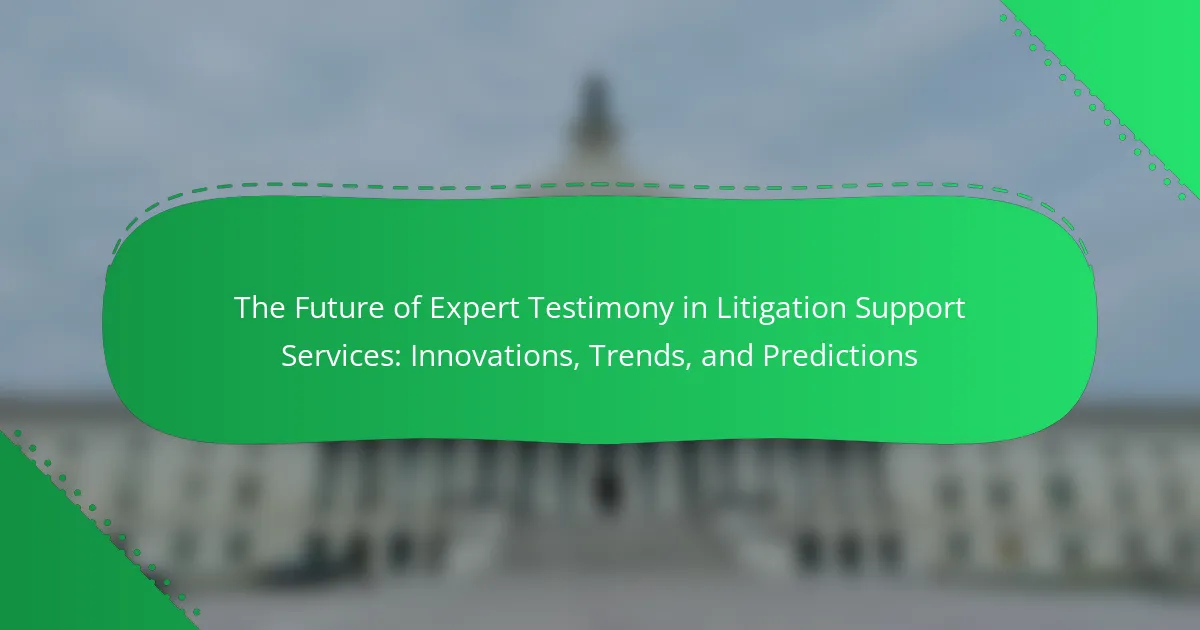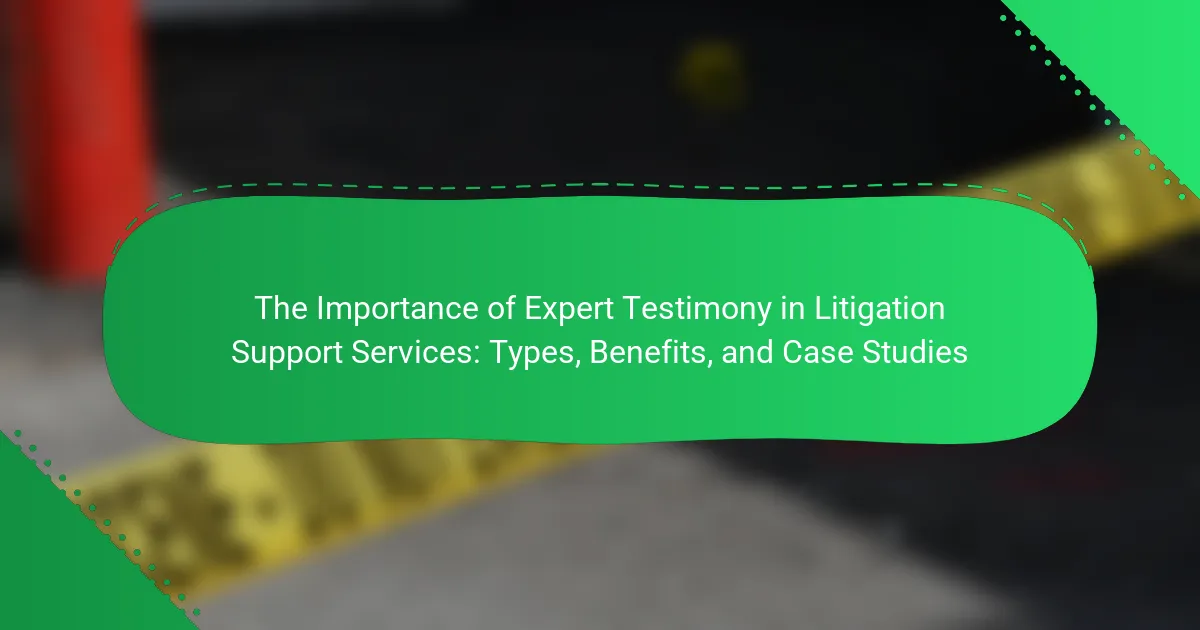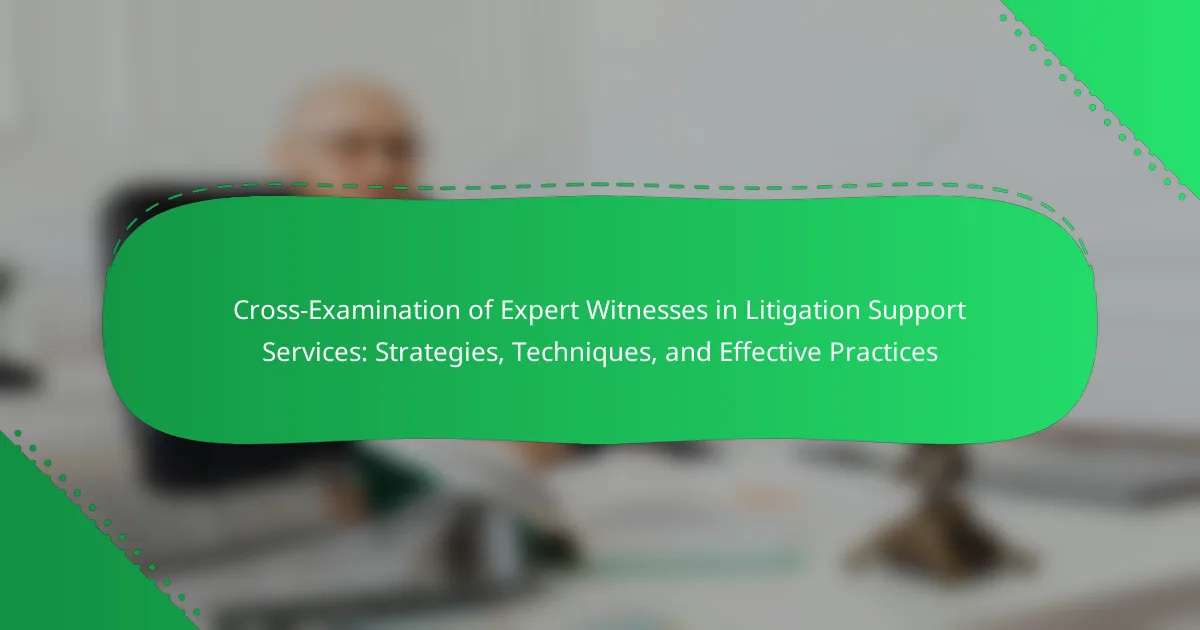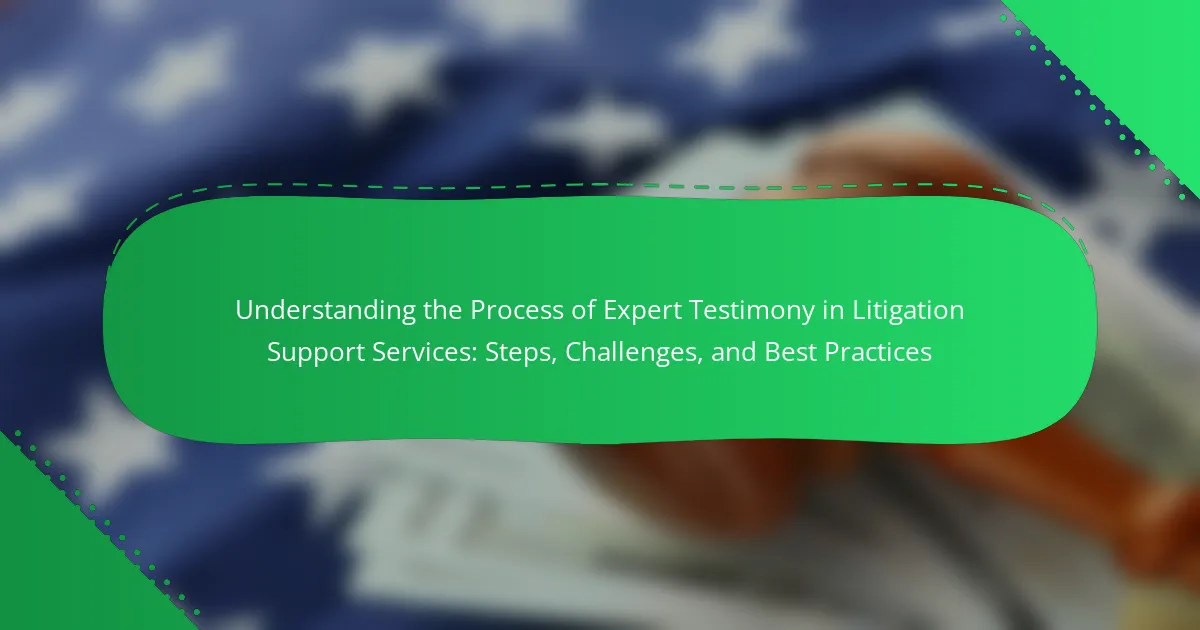Expert testimony is a vital component of litigation support services, providing specialized knowledge that helps clarify complex issues for judges and juries. This article explores the significant role of expert testimony in influencing case outcomes, validating evidence, and enhancing the credibility of legal arguments. It also examines the impact of technological innovations, such as artificial intelligence, virtual reality, and blockchain, on the future of expert testimony. These advancements are expected to improve the efficiency, reliability, and accessibility of expert contributions in legal proceedings, while increasing the demand for interdisciplinary experts. The article highlights emerging trends and predictions regarding the evolving landscape of expert testimony in the legal field.
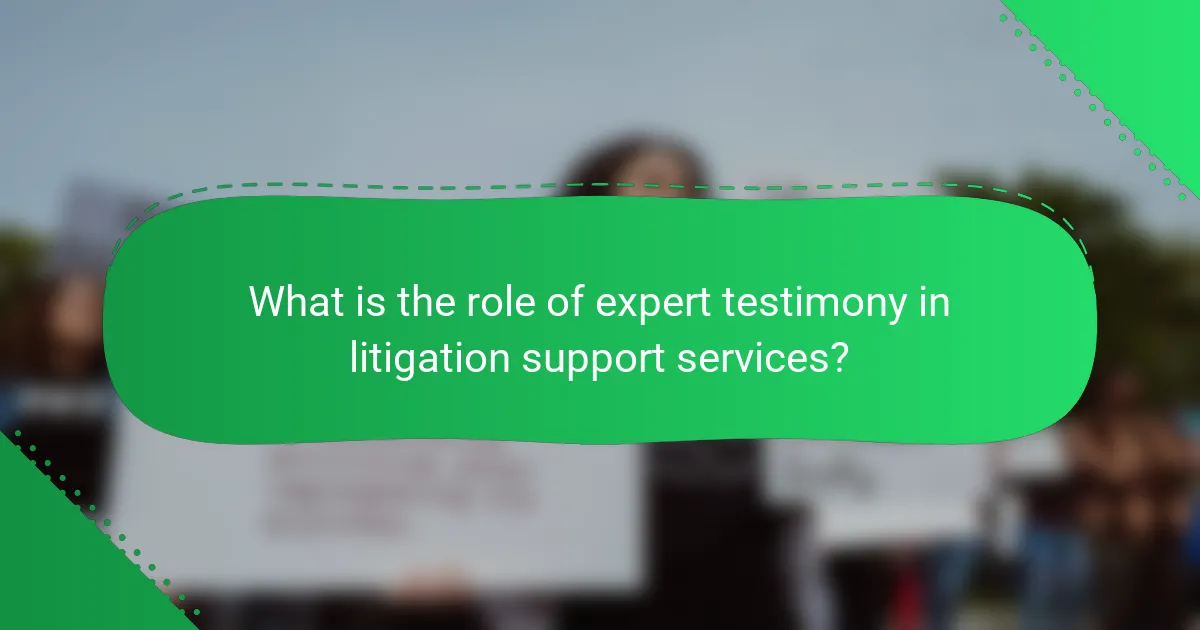
What is the role of expert testimony in litigation support services?
Expert testimony plays a crucial role in litigation support services. It provides specialized knowledge that assists in understanding complex issues. Experts clarify technical details that may be beyond the comprehension of a judge or jury. Their insights can significantly influence the outcome of a case. Expert testimony can validate evidence and support legal arguments. It often serves to establish credibility for the presenting party. Courts rely on expert opinions to make informed decisions. The impact of expert testimony can lead to favorable settlements or verdicts.
How has the role of expert testimony evolved over time?
The role of expert testimony has evolved significantly over time. Historically, expert witnesses were primarily used in a limited capacity. Their input was often based on personal experience rather than scientific evidence. Over the decades, the legal system has increasingly recognized the value of empirical data and specialized knowledge.
The Daubert standard, established in 1993, transformed how expert testimony is evaluated. This standard requires that expert evidence be both relevant and reliable. It emphasizes the need for scientific validity in expert opinions. As a result, experts are now expected to base their testimony on established methodologies.
Additionally, the rise of technology has changed expert testimony’s landscape. Experts now utilize advanced tools for data analysis and visualization. This shift enhances the clarity and impact of their testimony. Furthermore, interdisciplinary collaboration has become more common among experts. This collaboration allows for a more comprehensive understanding of complex issues.
Overall, the evolution of expert testimony reflects a broader trend toward accountability and scientific rigor in legal proceedings.
What historical factors have influenced expert testimony in litigation?
Historical factors influencing expert testimony in litigation include the evolution of legal standards and practices. In the 19th century, expert testimony was often viewed with skepticism. The Frye Standard established in 1923 required that scientific evidence be generally accepted in the relevant field. This standard shaped how experts were qualified and their credibility assessed.
The Daubert ruling in 1993 further refined the criteria for admissibility. It emphasized the reliability and relevance of expert testimony. This ruling allowed judges to act as gatekeepers of expert evidence. As a result, the qualifications of experts became more scrutinized.
Additionally, the growth of specialized fields has influenced expert testimony. As disciplines advanced, the need for specific expertise increased. This led courts to recognize the importance of expert opinions in complex cases. These historical factors collectively shaped the current landscape of expert testimony in litigation.
How do changes in law impact the use of expert testimony?
Changes in law significantly impact the use of expert testimony. Legal reforms can alter the admissibility standards for expert witnesses. For example, the Daubert standard requires that expert testimony be based on scientifically valid reasoning. When laws evolve, they may introduce new criteria for evaluating expert qualifications. This can lead to stricter scrutiny of expert opinions in court. Additionally, changes in law can influence the types of experts needed for specific cases. As laws become more complex, specialized expertise may become essential. These shifts can affect the availability and selection of expert witnesses in litigation. Consequently, legal practitioners must stay informed about legislative changes to effectively utilize expert testimony.
What are the key attributes of effective expert testimony?
Effective expert testimony is characterized by credibility, clarity, relevance, and objectivity. Credibility is established through the expert’s qualifications and experience in the field. Clarity involves presenting complex information in an understandable manner. Relevance ensures that the testimony directly addresses the issues at hand. Objectivity requires the expert to remain unbiased and impartial in their opinions. These attributes are essential for influencing the decision-making process in litigation. Studies show that jurors are more likely to trust testimony that meets these criteria, enhancing the overall impact of the expert’s contributions.
What qualifications should an expert witness possess?
An expert witness should possess specialized knowledge in a relevant field. This includes advanced degrees or certifications in their area of expertise. They must have practical experience that demonstrates their proficiency. Additionally, effective communication skills are essential for conveying complex information clearly. An expert witness should also have a strong understanding of legal procedures and courtroom decorum. Their credibility is enhanced by a history of peer recognition or publications in their field. These qualifications ensure that their testimony is both reliable and persuasive in legal contexts.
How does the credibility of an expert witness affect legal outcomes?
The credibility of an expert witness significantly influences legal outcomes. Credible expert witnesses are more likely to be trusted by judges and juries. This trust can lead to greater weight being given to their testimony. Studies show that juries often rely on expert opinions to make informed decisions. For instance, a study by the National Center for State Courts found that juries are swayed by the perceived reliability of expert witnesses. High credibility can enhance the persuasiveness of the expert’s testimony. Conversely, a lack of credibility may result in dismissal of the expert’s opinions. Ultimately, the credibility of an expert witness can be a decisive factor in the success of a legal case.
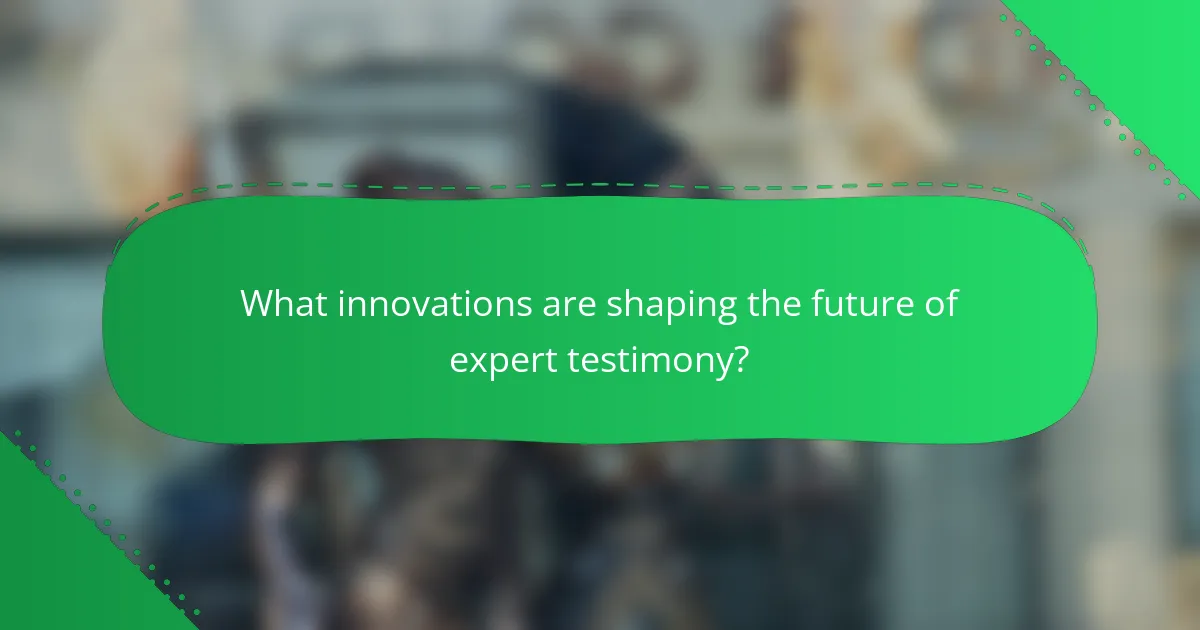
What innovations are shaping the future of expert testimony?
Innovations shaping the future of expert testimony include advancements in technology and data analytics. Artificial intelligence is enhancing the analysis of evidence and case preparation. Virtual reality is being used for immersive demonstrations of expert testimony. Remote testimony platforms are increasing accessibility for experts. Blockchain technology is ensuring the integrity of evidence. These innovations improve the efficiency and reliability of expert contributions in legal proceedings. Research indicates that 70% of legal professionals believe technology will significantly impact expert testimony in the next decade.
How is technology influencing expert testimony in litigation?
Technology is significantly influencing expert testimony in litigation by enhancing the accuracy and reliability of evidence presented. Digital tools enable experts to analyze vast amounts of data efficiently. For instance, advanced software can process and visualize complex information quickly. This capability allows experts to present findings in a more understandable format. Additionally, technology facilitates remote testimonies through video conferencing. This approach saves time and resources for all parties involved. Moreover, artificial intelligence aids in predicting case outcomes based on historical data. Research indicates that cases supported by technology-driven insights often achieve faster resolutions. Overall, technology streamlines expert testimony, making it more effective in legal proceedings.
What role do digital tools play in preparing expert witnesses?
Digital tools enhance the preparation of expert witnesses by streamlining their research and presentation processes. They facilitate access to vast databases and resources, allowing experts to gather relevant information efficiently. These tools also enable the organization of data into clear, concise formats suitable for court presentations. Additionally, digital platforms support collaboration among legal teams and experts, improving communication and strategy development. For instance, case management software can track deadlines and document revisions. Overall, digital tools significantly increase the effectiveness and reliability of expert witness preparation in litigation.
How is artificial intelligence being integrated into expert testimony?
Artificial intelligence is being integrated into expert testimony through data analysis and predictive modeling. AI tools analyze large volumes of case data to identify patterns and trends. This enhances the accuracy of expert opinions and predictions. AI can also assist in preparing expert witnesses by simulating cross-examinations. Additionally, AI algorithms help in evaluating the credibility of evidence. Studies show that AI can improve decision-making in legal contexts. For example, the use of AI in legal research has increased efficiency by up to 50%. These advancements demonstrate AI’s growing role in expert testimony.
What are the emerging trends in expert testimony?
Emerging trends in expert testimony include the increased use of technology and data analytics. Experts are leveraging advanced software to analyze evidence more efficiently. Virtual testimony is becoming more common, allowing experts to present remotely. This trend reduces travel costs and time for both parties involved. Additionally, interdisciplinary approaches are gaining traction. Experts from various fields collaborate to provide comprehensive insights. There is also a growing emphasis on the credibility of expert witnesses. Courts are scrutinizing qualifications and methodologies more rigorously. Finally, the demand for clear communication is rising. Experts must convey complex information in an understandable manner. These trends indicate a shift towards a more efficient and transparent expert testimony process.
How are remote depositions changing the landscape of expert testimony?
Remote depositions are significantly transforming the landscape of expert testimony. They enable experts to provide testimony from any location, enhancing accessibility. This flexibility reduces travel costs and time for both experts and legal teams. Remote depositions also allow for a broader selection of experts, regardless of geographic constraints. The technology used enhances the clarity of communication, often incorporating video and audio tools. Additionally, remote depositions can increase the efficiency of the litigation process. Studies indicate that remote depositions can lead to faster case resolutions. Overall, these changes are reshaping how expert testimony is gathered and presented in legal proceedings.
What trends are being observed in the types of cases requiring expert testimony?
There is a noticeable increase in cases requiring expert testimony in technology-related fields. This trend includes areas such as cybersecurity, data privacy, and artificial intelligence. The rise in digital evidence necessitates specialized knowledge for accurate interpretation. Additionally, cases involving medical malpractice are increasingly demanding expert opinions. The complexity of medical procedures and technologies drives this need. Moreover, environmental litigation is on the rise, requiring expertise in environmental science and regulations. This shift reflects growing public awareness and regulatory scrutiny. Overall, the evolving legal landscape is shaping the demand for diverse expert testimony across various sectors.
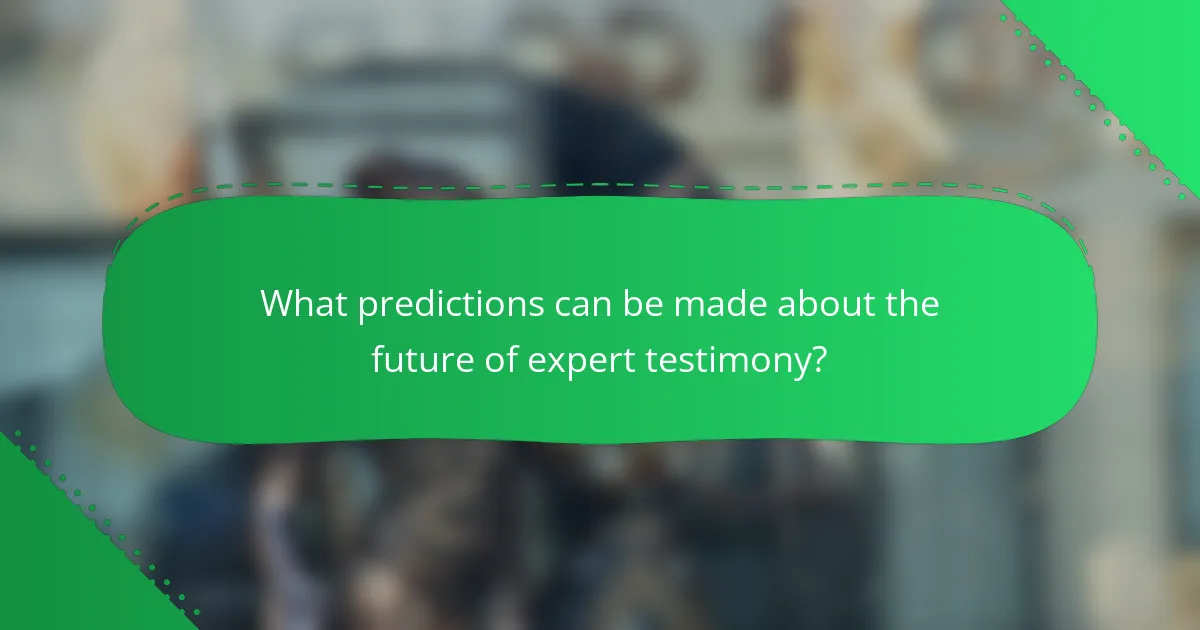
What predictions can be made about the future of expert testimony?
The future of expert testimony is likely to see increased reliance on technology. Advancements in artificial intelligence will enhance the analysis of complex data. This will improve the accuracy of expert opinions presented in court. Virtual reality may also be used for immersive demonstrations of expert findings. Furthermore, remote testimony will become more common due to its convenience and cost-effectiveness. The demand for interdisciplinary experts will rise as cases become more complex. There will be greater scrutiny of expert qualifications and methodologies. These trends indicate a shift towards more data-driven and accessible expert testimony in litigation.
How might legal frameworks adapt to future expert testimony needs?
Legal frameworks may adapt to future expert testimony needs by incorporating technological advancements. These adaptations could include the use of artificial intelligence to analyze data and provide insights. Courts might establish guidelines for the admissibility of AI-generated evidence. Additionally, remote testimony could become more accepted, allowing experts to testify via video conferencing. This flexibility may enhance accessibility for expert witnesses. Legal standards may evolve to address the qualifications of experts in emerging fields. Furthermore, ongoing training and certification requirements could be implemented for experts. This would ensure they remain current with technological and methodological changes. Overall, these adaptations aim to improve the reliability and efficiency of expert testimony in legal proceedings.
What potential challenges could arise for expert witnesses in the future?
Expert witnesses may face challenges related to evolving technology and changing legal standards. The rise of artificial intelligence could impact the reliability of expert testimony. Additionally, courts may adopt stricter criteria for admitting expert opinions. This could require witnesses to demonstrate more rigorous qualifications and methodologies. Increasing scrutiny on biases in expert testimony could also pose difficulties. Furthermore, the demand for transparency in expert witness fees and processes may rise. These factors could complicate the role and effectiveness of expert witnesses in litigation.
How can expert witnesses prepare for upcoming changes in litigation support services?
Expert witnesses can prepare for upcoming changes in litigation support services by staying informed about technological advancements. They should regularly attend industry conferences and workshops to learn about new tools and methodologies. Engaging with peer networks can provide insights into evolving best practices. Additionally, expert witnesses should familiarize themselves with emerging legal technologies, such as AI-driven analysis and virtual testimony platforms.
Continuous education in legal standards and regulations is essential for compliance. They should also seek feedback from attorneys on their performance and adapt accordingly. Research indicates that expert witnesses who embrace innovation are more likely to succeed in a changing landscape. For instance, a study by the National Center for State Courts emphasizes the importance of adaptability in expert testimony.
What best practices should be followed for effective expert testimony?
Effective expert testimony requires clear communication. Experts should present facts in a straightforward manner. They must stay within their area of expertise. Preparation is crucial for understanding the case details. Experts should anticipate potential questions and challenges. They should use visual aids to enhance understanding. Consistency in testimony strengthens credibility. Finally, experts must maintain professionalism throughout the process. These practices ensure that expert testimony is impactful and reliable.
How can expert witnesses enhance their communication skills for better impact?
Expert witnesses can enhance their communication skills by engaging in targeted training programs. These programs often focus on public speaking, active listening, and simplifying complex information. Practicing these skills helps expert witnesses convey their expertise more effectively. Utilizing feedback from peers and mentors can also refine their delivery. Additionally, expert witnesses should familiarize themselves with legal terminology to ensure clarity. Research shows that effective communication can significantly influence jury perceptions. A study by the National Center for State Courts found that jurors respond better to clear and concise testimony. Therefore, enhancing communication skills leads to a more impactful presence in court.
What strategies can legal teams implement to select the right expert witnesses?
Legal teams can implement several strategies to select the right expert witnesses. First, they should assess the expert’s qualifications and experience in the relevant field. This includes reviewing their educational background, professional credentials, and prior testimony experience. Second, legal teams should evaluate the expert’s communication skills. An effective expert can explain complex concepts clearly to a jury. Third, teams should consider the expert’s reputation and credibility within the industry. A well-respected expert can enhance the case’s strength. Fourth, they should conduct interviews to gauge the expert’s compatibility with the case strategy. This ensures alignment in understanding the legal arguments. Fifth, legal teams should analyze the expert’s availability and willingness to commit time to the case. Finally, they should review past case outcomes where the expert has testified. This provides insight into the expert’s effectiveness in similar situations. These strategies help ensure that the selected expert witness will contribute positively to the case.
The main entity of the article is expert testimony in litigation support services. The article provides a comprehensive overview of the evolving role of expert testimony, highlighting its significance in clarifying complex issues, influencing legal outcomes, and establishing credibility. It discusses historical influences, the impact of technological innovations, and emerging trends shaping the future of expert testimony, including the integration of artificial intelligence and remote depositions. Key attributes of effective expert testimony and best practices for expert witnesses are also examined, alongside strategies for legal teams to select the right experts.
